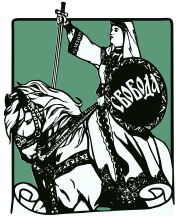
Back Konstitusiyalı Demokratiya Partiyası Azerbaijani Канстытуцыйна-дэмакратычная партыя Byelorussian Конституционно-демократическа партия Bulgarian Үндэһэн хуулиин арадшалһан нам BXR Partit Constitucional Democràtic Rus Catalan Konstitučně demokratická strana Czech Kadetpartiet Danish Konstitutionell-Demokratische Partei German Συνταγματικό Δημοκρατικό Κόμμα Greek Konstitucia Demokratia Partio Esperanto
This article needs additional citations for verification. (April 2014) |
Constitutional Democratic Party / Party of Peoples Freedom Конституционно-демократическая партия / Па́ртия Наро́дной Свобо́ды | |
|---|---|
 | |
| Abbreviation | K-D; Kadets |
| President | Pavel Miliukov |
| Founders |
|
| Founded | 12 October 1905 |
| Banned | 11 December 1917[1] |
| Merger of | |
| Headquarters | Saint Petersburg |
| Newspaper | Rech |
| Ideology | |
| Political position |
|
| Colours | Azure White |
| Slogan | Skill and work for the good of the Motherland (Russian: Умение и труд на благо Родине) |
| State Duma (1906) | 178 / 497 |
| State Duma (Jan 1907) | 124 / 518 |
| State Duma (Oct 1907) | 54 / 441 |
| State Duma (1912) | 59 / 432 |
| Constituent Assembly | 24 / 766 |
The Constitutional Democratic Party (Russian: Конституцио́нно-демократи́ческая па́ртия, romanized: Konstitutsionno-demokraticheskaya partiya, K-D), also called Constitutional Democrats and formally the Party of People's Freedom (Russian: Па́ртия Наро́дной Свобо́ды), was a political party in the Russian Empire that promoted Western constitutional monarchy—among other policies—and attracted a base ranging from moderate conservatives to mild socialists.[11][12] Party members were called Kadets (or Cadets) from the abbreviation K-D of the party name.[13] Konstantin Kavelin's and Boris Chicherin's writings formed the theoretical basis of the party's platform. Historian Pavel Miliukov was the party's leader throughout its existence.
The Kadets' base of support were primarily intellectuals and professionals; university professors and lawyers were particularly prominent within the party.[14] Many Kadet party members were veterans of the zemstvo, local councils.[15] The Constitutional Democratic Party formed from the merger of several liberal groupings, namely the Union of Liberation, the Union of Zemstvo Constitutionalists and the Union of Unions as well as the organization of bourgeois professionals and intellectuals, including teachers, lawyers, writers, physicians and engineers.[16][17]
The Kadets' liberal economic program favored the workers' right to an eight-hour day[18] and the right to take strike action. The Kadets "were unwaveringly committed to full citizenship for all of Russia's minorities" and supported Jewish emancipation.[19] The party drew significant support from Jews[20] until 1916,[21] and Volga Germans and a significant number of each group were active party members.[22][23] On the other hand, the Kadets adhered to Russian nationalism as they largely based their identity on "Russian nation" or the "Russian people" as something opposed to the state bureaucracy; since 1905, they drifted towards statism, and their views on foreign politics were based on the view of international politics as a "national struggle", and they generally advocated for Russian imperialism, describing Russians as Staatsvolk, and the Russian Empire as their nation-state. However, they differed from the hardline ethnocentric Russian nationalists, as they understood Russians rather as a political identity and defended the rights of ethnic minorities and nations of Russia to have cultural authonomies and to enter the Russian nation. Such views and Pan-Slavism, which they shared with the other moderate right-wing parties, drove them into very hostile attitude towards Germany and Austria-Hungary during the World War I,[7][3][4][5][6] and by 1917, they were strongly nationalist and defensist;[24] during the Russian Civil War, they became proponents of military dictatorship and territorial integrity of the Russian Empire, and were the strongest supporters of the Whites next to the nationalist parties.[25]
- ^ https://www.marxists.org/archive/lenin/works/1917/nov/28.htm Decree On The Arrest Of The Leaders Of The Civil War Against The Revolution
- ^ Struve, Peter (1932). The Social Liberalism. Internationales Handwtsrterbuch des Gewerkschaftswesens. pp. 412–423.
- ^ a b Liberals in the Russian Revolution. Princeton University Press. 12 March 2019. ISBN 978-0-691-65677-9.
- ^ a b The Nation-state in Question. Princeton University Press. 5 October 2003. ISBN 978-0-691-11509-2.
- ^ a b Nationalismen in Europa: West- und Osteuropa im Vergleich. Wallstein Verlag. 2001. ISBN 978-3-89244-479-4.
- ^ a b The Russian Constitutional Experiment: Government and Duma, 1907-1914. CUP Archive. 10 May 1973. ISBN 978-0-521-20041-7.
- ^ a b Russian Liberalism. Cornell University Press. 15 September 2023. ISBN 978-1-5017-7215-3.
- ^ Maksimov, Konstantin Nikolaevich (2008). Kalmykia in Russia's Past and Present National Policies and Administrative System. Central European University Press. pp. 172–173. ISBN 9789639776173.
- ^ World War One: The Global Revolution. Cambridge University Press. 31 March 2011. ISBN 978-0-521-51648-8.
- ^ Chattopadhyay, Kunal (2017). "Revolutionary Democracy in 1917 and the Bolsheviks". Economic and Political Weekly. 52 (44): 62–72. JSTOR 26697623.
- ^ Pipes, Richard (2011-05-04). Russia Under the Bolshevik Regime. Knopf Doubleday Publishing Group. ISBN 978-0-307-78861-0.
- ^ Pearson, Raymond (1977). The Russian Moderates and the Crisis of Tsarism 1914–1917. Springer. pp. 2–3.
- ^ This name should not be confused with the term cadets, which referred to students at military schools in the Imperial Russia.
- ^ Hans Rogger, Jewish Policies and Right-wing Politics in Imperial Russia, p. 20.
- ^ The Zemstvo in Russia: An Experiment in Local Self-government (eds. Terence Emmons & Wayne S. Vucinich), p. 441.
- ^ Melissa Kirschke Stockdale, Paul Miliukov and the Quest for a Liberal Russia, 1880–1918, p. 142.
- ^ James W. Long, From Privileged to Dispossessed: The Volga Germans, 1860–1917, p. 207.
- ^ Peter Gatrell, Government, Industry and Rearmament in Russia, 1900–1914: The Last Argument of Tsarism, p. 81.
- ^ Rogger, p. 20.
- ^ Rogger, p. 20.
- ^ A Nation of Refugees: Russia's Jews in World War I. Oxford University Press. 2024. ISBN 978-0-19-762935-2.
- ^ Rogger, p. 20.
- ^ Long, pp. 207–208.
- ^ The Russian Revolution, 1917. Cambridge University Press. 2 February 2017. ISBN 978-1-107-13032-6.
- ^ The Lost Opportunity: Attempts at Unification of the Anti-Bolsheviks:1917-1919: Moscow, Kiev, Jassy, Odessa. University Press of America. 15 September 2008. ISBN 978-0-7618-4200-2.